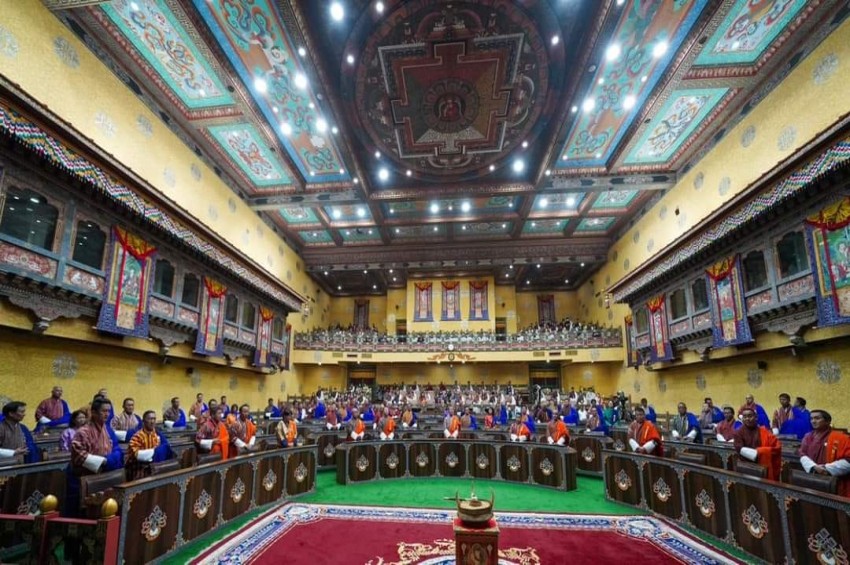The compulsory retirement of two foresters with benefits by the Ministry of Agriculture and Forests (MoAF) “for talking with the media,” was one of the most discussed and debated issues of the week. As in most cases, those aware of the issue are divided, with some saying it is unjust for the MoAF to take such actions, just because the two exercised the freedom of expression, while there are others who say the Ministry erred by saying the two were “compulsorily retired for talking with the media,” while the action was taken as they violated some provisions of the BCSR 2018.
The issue began after the MoAF took out transfer orders for seven employees – six females and one male. The seven were working for different projects and were told that the projects would be discontinued. From the six women, five are single mothers. But they wrote back to the Ministry saying they are victimized and that the discontinuation of the projects is just a pretext to get them out from Thimphu.
Civil servants that The Journalist spoke to say the two should not have gone live on Bhutan Broadcasting Service (BBS). “Yes. The Constitution of Bhutan gives us the freedom of expression. But it also says the Royal Civil Service Commission shall function in accordance with the Civil Service Act, which is the BCSR 2018 and the two violated Civil Service Core Values,” a civil servant seeking anonymity said, adding they could have spoken to the print media, where their identities would have been protected. He underlined that Section 19.4, “Causes for Disciplinary Action” of the BCSR 2018, says disciplinary action against a civil servant shall be taken for offense related to: 19.4.1 Duties of civil servants; 19.4.2 Performance; and 19.4.3 Civil Service Values and Conduct. “In this case it was breach of Section 19.4.3.”
“The BCSR 2018 Section 14.11. says that civil servants failing to abide by the Transfer Order shall be liable for administrative actions. From what I heard, the seven were issued transfer orders more than a month back, which gives the Ministry the right to take action,” another civil servant said. She added that this incident is a message to all civil servants who do not want to leave Thimphu and other urban areas. “The seven are similar to the executives who were managed out. It is a signal that if one does not follow transfer orders, or breaches the code of conduct, action will be taken,” she added. According to her, the BCSR 2018, clearly says that all civil servants should read and understand the Constitution and the BCSR.
“There are several provisions that most civil servants overlook or do not even bother about, such as integrity; which means putting the obligations of public service above one’s personal interest while performing the duty; loyalty to agency, the Royal Government, putting official obligations before personal interests,” she underlined.
Rinchen Phuntsho, a private employee, based in Thimphu said apart from MoAF making the mistake that action against the two were taken for speaking to the media, the ministry has implemented the rules. “I have heard and seen politicians and leaders getting calls from people who are transferred from Thimphu to revoke the transfers. Now, every agency and ministry has to do like what the MoAF did,” he said. “Otherwise, there will be public uproar and I think this is also part of the civil service reform,” he said.
Meanwhile, the Royal Civil Service Commission (RCSC) when asked for comments on the case said Public Service Delivery is at the heart of the Civil Service and in doing so, the Civil Service must be accountable for transparent, effective and efficient use of human and financial resources. “The Civil Service is also expected to abide by its code of conduct and values as enshrined in the Bhutan CS Rules and Regulations, 2018 in the conduct of its business to ensure discipline, accountability and integrity,” an officer from the RCSC said.
The officer added that the Ministry’s HR Committee, which is the highest HR decision making authority in their respective ministries are empowered by the BCSR, 2018 to take the required decisions and actions to manage their staff. “The decision taken to compulsorily retire the two foresters is in alignment to their delegated authority. Such HR actions are important to uphold the Civil Service to the highest level of professionalism, accountability and productivity,” the officer added. According to the officer, “this has been diminishing in recent years leading to systemic weakening of the Civil Service.” “Our citizens should get the services that they deserve and agencies should ensure it by effectively managing their staff. RCSC will hold all civil service agencies responsible to implement their delegated authority effectively,” the officer said.
Civil servants also have rights. Section 19.2 of the BCSR 2018 says: “Every civil servant subject to disciplinary action shall have the right to: 19.2.1 Written reasons for any disciplinary action that is taken against him/her; 19.2.2 Prior and adequate notice of the nature and reasons for the intended disciplinary action; 19.2.3 Opportunity to be heard and placed on record; and 19.2.4 Right to an appeal or review of a disciplinary decision.”
Further, Section 9.3.1 says: “The Commission shall hear and decide all administrative and disciplinary issues and grievances concerning a civil servant on being approached by individual civil servants as per the provisions of the Rule, except criminal proceedings, which shall be under the jurisdiction of Courts.”
Civil servants also have the rights to appeal. Section 19.13.1 of the BCSR 2018 says: “A civil servant aggrieved by a decision of the Disciplinary Committee has the right to appeal to the Appellate Authority. In the event an aggrieved civil servant or oversight Agency has observed inconsistencies in the disciplinary action, the case may be appealed to the Appellate Authority.”
Section 19.13.4 further says: “A decision on the appeal shall be rendered within 30 days from receipt of the appeal. 19.13.5 An aggrieved civil servant, if not satisfied with the decision of the ultimate Appellate Authority, namely, Administrative Tribunal, may appeal against such decision to the High Court or Supreme Court.”
The MoAF also issued a statement in the nation’s daily paper saying “rules and regulations put in place to ensure that civil servants conduct ourselves professionally and hold ourselves to the highest standards have been violated repeatedly over the years, without any consequences,” which has led to a systemic weakening of the civil service. Saying this is unacceptable for a small country like Bhutan, where civil servants must lead by example in service of the people of Bhutan, the statement says accountability will be fixed on anyone who fails to deliver their duties as a civil servant and uphold the civil service code of conduct.
“The two forestry officials were compulsory retired with benefits for insubordination – for violating orders for deployment and for violating the Civil Service Values and Conduct as articulated under Chapter 3 of the Bhutan Civil Service Rules and Regulations 2018. The MoAF stands by its decision to compulsorily retire the two forestry officials and will not tolerate insubordination and violations of the civil service code of conduct by any civil servants under MoAF henceforth,” the statement reads.
The MoAF has also stated that it recognizes and values the role of the media in ensuring the transparent dissemination of information to the public. “To this end, media focals are being nominated and processes streamlined to ensure that correct and timely information is shared with the media in a responsible manner.” The Ministry has said this was the intent behind the internal notification dated 5th April 2022 and that it assures the media that it firmly believes in and supports the media’s role in strengthening transparency and accountability.
The issue began after the MoAF took out transfer orders for seven employees – six females and one male. The seven were working for different projects and were told that the projects would be discontinued. From the six women, five are single mothers. But they wrote back to the Ministry saying they are victimized and that the discontinuation of the projects is just a pretext to get them out from Thimphu.
Civil servants that The Journalist spoke to say the two should not have gone live on Bhutan Broadcasting Service (BBS). “Yes. The Constitution of Bhutan gives us the freedom of expression. But it also says the Royal Civil Service Commission shall function in accordance with the Civil Service Act, which is the BCSR 2018 and the two violated Civil Service Core Values,” a civil servant seeking anonymity said, adding they could have spoken to the print media, where their identities would have been protected. He underlined that Section 19.4, “Causes for Disciplinary Action” of the BCSR 2018, says disciplinary action against a civil servant shall be taken for offense related to: 19.4.1 Duties of civil servants; 19.4.2 Performance; and 19.4.3 Civil Service Values and Conduct. “In this case it was breach of Section 19.4.3.”
“The BCSR 2018 Section 14.11. says that civil servants failing to abide by the Transfer Order shall be liable for administrative actions. From what I heard, the seven were issued transfer orders more than a month back, which gives the Ministry the right to take action,” another civil servant said. She added that this incident is a message to all civil servants who do not want to leave Thimphu and other urban areas. “The seven are similar to the executives who were managed out. It is a signal that if one does not follow transfer orders, or breaches the code of conduct, action will be taken,” she added. According to her, the BCSR 2018, clearly says that all civil servants should read and understand the Constitution and the BCSR.
“There are several provisions that most civil servants overlook or do not even bother about, such as integrity; which means putting the obligations of public service above one’s personal interest while performing the duty; loyalty to agency, the Royal Government, putting official obligations before personal interests,” she underlined.
Rinchen Phuntsho, a private employee, based in Thimphu said apart from MoAF making the mistake that action against the two were taken for speaking to the media, the ministry has implemented the rules. “I have heard and seen politicians and leaders getting calls from people who are transferred from Thimphu to revoke the transfers. Now, every agency and ministry has to do like what the MoAF did,” he said. “Otherwise, there will be public uproar and I think this is also part of the civil service reform,” he said.
Meanwhile, the Royal Civil Service Commission (RCSC) when asked for comments on the case said Public Service Delivery is at the heart of the Civil Service and in doing so, the Civil Service must be accountable for transparent, effective and efficient use of human and financial resources. “The Civil Service is also expected to abide by its code of conduct and values as enshrined in the Bhutan CS Rules and Regulations, 2018 in the conduct of its business to ensure discipline, accountability and integrity,” an officer from the RCSC said.
The officer added that the Ministry’s HR Committee, which is the highest HR decision making authority in their respective ministries are empowered by the BCSR, 2018 to take the required decisions and actions to manage their staff. “The decision taken to compulsorily retire the two foresters is in alignment to their delegated authority. Such HR actions are important to uphold the Civil Service to the highest level of professionalism, accountability and productivity,” the officer added. According to the officer, “this has been diminishing in recent years leading to systemic weakening of the Civil Service.” “Our citizens should get the services that they deserve and agencies should ensure it by effectively managing their staff. RCSC will hold all civil service agencies responsible to implement their delegated authority effectively,” the officer said.
Civil servants also have rights. Section 19.2 of the BCSR 2018 says: “Every civil servant subject to disciplinary action shall have the right to: 19.2.1 Written reasons for any disciplinary action that is taken against him/her; 19.2.2 Prior and adequate notice of the nature and reasons for the intended disciplinary action; 19.2.3 Opportunity to be heard and placed on record; and 19.2.4 Right to an appeal or review of a disciplinary decision.”
Further, Section 9.3.1 says: “The Commission shall hear and decide all administrative and disciplinary issues and grievances concerning a civil servant on being approached by individual civil servants as per the provisions of the Rule, except criminal proceedings, which shall be under the jurisdiction of Courts.”
Civil servants also have the rights to appeal. Section 19.13.1 of the BCSR 2018 says: “A civil servant aggrieved by a decision of the Disciplinary Committee has the right to appeal to the Appellate Authority. In the event an aggrieved civil servant or oversight Agency has observed inconsistencies in the disciplinary action, the case may be appealed to the Appellate Authority.”
Section 19.13.4 further says: “A decision on the appeal shall be rendered within 30 days from receipt of the appeal. 19.13.5 An aggrieved civil servant, if not satisfied with the decision of the ultimate Appellate Authority, namely, Administrative Tribunal, may appeal against such decision to the High Court or Supreme Court.”
The MoAF also issued a statement in the nation’s daily paper saying “rules and regulations put in place to ensure that civil servants conduct ourselves professionally and hold ourselves to the highest standards have been violated repeatedly over the years, without any consequences,” which has led to a systemic weakening of the civil service. Saying this is unacceptable for a small country like Bhutan, where civil servants must lead by example in service of the people of Bhutan, the statement says accountability will be fixed on anyone who fails to deliver their duties as a civil servant and uphold the civil service code of conduct.
“The two forestry officials were compulsory retired with benefits for insubordination – for violating orders for deployment and for violating the Civil Service Values and Conduct as articulated under Chapter 3 of the Bhutan Civil Service Rules and Regulations 2018. The MoAF stands by its decision to compulsorily retire the two forestry officials and will not tolerate insubordination and violations of the civil service code of conduct by any civil servants under MoAF henceforth,” the statement reads.
The MoAF has also stated that it recognizes and values the role of the media in ensuring the transparent dissemination of information to the public. “To this end, media focals are being nominated and processes streamlined to ensure that correct and timely information is shared with the media in a responsible manner.” The Ministry has said this was the intent behind the internal notification dated 5th April 2022 and that it assures the media that it firmly believes in and supports the media’s role in strengthening transparency and accountability.

















